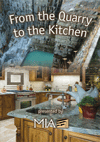Now, before you stone “purists†out there begin writing us the requisite hate mail, I think it's important to understand why this type of article is important at this day and age, and why we made the trip to their facilities outside of Washington, DC. First of all, quartz surfacing -- whether it is Silestone, Zodiaq, CaesarStone or otherwise -- has made such inroads in our industry that it would be foolhardy to ignore the fact that it exists. Many fabricators who have been working with natural stone for decades now also fabricate quartz surfacing to fulfill the requests of their customers.
Conversely, many fabricators who had historically specialized in laminates or solid surfaces have eventually moved into quartz surfacing and ultimately into natural stone. One example of this can be found in our feature of East Coast Associates (page 110), which we visited in Virginia. This company made the move into natural stone less than a year ago, and they entered the business with the professionalism they had learned over the years working with homeowners. And many other fabricators that are included in the “Fabricator Case Studies†section of this issue also fabricate both natural stone and quartz surfacing.
The simple fact is that there is significant crossover between natural stone and quartz surfacing, including fabricating techniques, machinery, tooling, templating and so forth. But there are also practical lessons to be learned in terms of simply operating a countertop production facility. This is particularly important for newer fabricators who know the ins and outs of stone fabrication, but have not necessarily had to face some of the customer service issues and follow-up that is part of running your own business.
As I toured Counter Intelligence's operation, I was quite impressed by the level of sophistication it maintains. From beginning to end, a project is carefully tracked by customer service representatives by computer, and it is cross-checked at each stage -- all with an eye on making sure that things are done right, that communication between all parties is clear, and that the customer will ultimately be satisfied. I suppose I shouldn't have been all that surprised, because you need some system of organization if you're doing 35 kitchens per day, but it was nevertheless impressive.
This is not, of course, to say that this level of customer service is absent from fabricators of natural stone. In fact, most fabricators also have a keen eye on customer satisfaction -- probably more than most contractors that deal with homeowners (although I still shudder to include stone fabricators in the general category of “contractorsâ€). It is just nice to see the bar for quality control raised so high. In a time when competition is perhaps more difficult than ever, and when there are more fabricators than ever in the marketplace, it is important that the level of quality for stone fabrication is never compromised -- on any scale.
And there are many tools for quality control out there. In addition to sophisticated computer systems for templating, estimating, project tracking and inventory, there are resources for fabricators that require nothing more than the ability to operate a pencil. The Marble Institute of America is offering a package of forms that fabricators can use for each of their projects -- from jobsite checklists to homeowner satisfaction forms -- these documents were taken from fabricators around the country, and offer a comprehensive system for ensuring customer quality.
Like every industry, the stone business continues to change. Rather than bemoan these changes or long for “the good old days,†it is in the fabricators' best interest to keep an eye on what is going on in the field and to maintain stone's reputation as a premium building material.


